Fredrick A. Hudson (5 December 1863 in Winnipeg, Rupert's Land - 7 May 1932) was the manager of the Kenora Thistles for both the challenge for the Stanley Cup in 1905 (losing to Ottawa) and for of their 1907 Stanley Cup championship.
Fredrick A. Hudson (5 December 1863 in Winnipeg, Rupert's Land - 7 May 1932) was the manager of the Kenora Thistles for both the challenge for the Stanley Cup in 1905 (losing to Ottawa) and for of their 1907 Stanley Cup championship.

The National Hockey League is a professional ice hockey league in North America comprising 33 teams —26 in the United States and 7 in Canada. The Stanley Cup, the oldest professional sports trophy in North America, is awarded annually to the league playoff champion at the end of each season. The NHL is one of the major professional sports leagues in the United States and Canada and is considered to be the top ranked professional ice hockey league in the world, with players from 17 countries as of the 2023–24 season. The International Ice Hockey Federation (IIHF) also views the Stanley Cup as one of the "most important championships available to the sport". The NHL is headquartered in Midtown Manhattan.
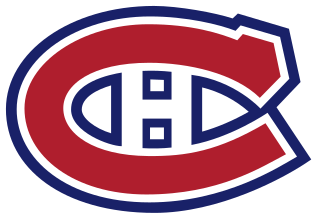
The Montreal Canadiens, officially le Club de hockey Canadien and colloquially known as the Habs, are a professional ice hockey team based in Montreal. The Canadiens compete in the National Hockey League (NHL) as a member of the Atlantic Division of the Eastern Conference. Since 1996, the team has played its home games at Bell Centre, originally known as Molson Centre. The Canadiens previously played at the Montreal Forum, which housed the team for seven decades and all but their first two Stanley Cup championships.

Accrington Stanley Football Club is a professional association football club based in Accrington, Lancashire, England, that compete in the EFL League Two, the fourth level of the English football league system. They have spent their complete history playing at the Crown Ground. The club came to national prominence in 1989 due to the Milk Marketing Board's popular television advert that featured the slogan Accrington Stanley, Who Are They?
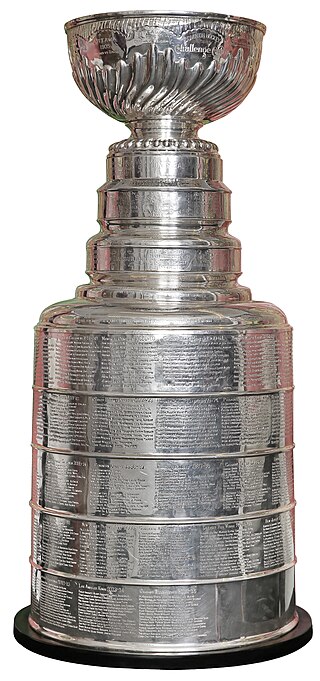
The Stanley Cup is the championship trophy awarded annually to the National Hockey League (NHL) playoff champion. It is the oldest existing trophy to be awarded to a professional sports franchise in North America, and the International Ice Hockey Federation (IIHF) considers it to be one of the "most important championships available to the sport". The trophy was commissioned in 1892 as the Dominion Hockey Challenge Cup and is named after Lord Stanley of Preston, the Governor General of Canada, who donated it as an award to Canada's top-ranking amateur ice hockey club. The entire Stanley family supported the sport, the sons and daughters all playing and promoting the game. The first Cup was awarded in 1893 to the Montreal Hockey Club, and winners from 1893 to 1914 were determined by challenge games and league play. Professional teams first became eligible to challenge for the Stanley Cup in 1906. In 1915, the National Hockey Association (NHA) and the Pacific Coast Hockey Association (PCHA), the two main professional ice hockey organizations, reached an agreement in which their respective champions would face each other annually for the Stanley Cup. It was established as the de facto championship trophy of the NHL in 1926 and then the de jure NHL championship prize in 1947.

The Presidents' Trophy is an award presented by the National Hockey League (NHL) to the team that finishes with the most points during the regular season. If two teams are tied for the most points, then the Trophy goes to the team with the most regulation wins (RW). The Presidents' Trophy has been awarded 37 times to 18 different teams since its inception during the 1985–86 NHL season.

The 2000 Stanley Cup Finals was the championship series of the National Hockey League's (NHL) 1999–2000 season, and the culmination of the 2000 Stanley Cup playoffs. It was contested by the Eastern Conference champion New Jersey Devils against the Western Conference champion and defending Stanley Cup champion Dallas Stars. The Devils were led by captain Scott Stevens, head coach Larry Robinson and goaltender Martin Brodeur. The Stars were led by captain Derian Hatcher, head coach Ken Hitchcock and goaltender Ed Belfour. The Devils defeated the Stars 4–2 in a six-game series to win their second Stanley Cup in franchise history. This was the first, and along with 2001 the only Finals where two relocated teams faced each other.
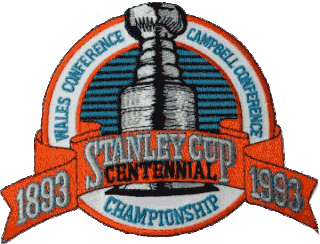
The 1993 Stanley Cup Finals was the championship series of the National Hockey League's (NHL) 1992–93 season, and the culmination of the 1993 Stanley Cup playoffs. It was contested between the Los Angeles Kings and the Montreal Canadiens. It was the first appearance in the Final for the Kings and the first appearance since the 1920 Stanley Cup Finals for a team based on the west coast of the United States. It was also the 34th appearance for Montreal, their first since the 1989 Stanley Cup Finals. The Canadiens won the series four games to one to win the team's 24th Stanley Cup. The year 1993 was the 100th anniversary of the first awarding of the Stanley Cup in 1893, and the first Finals to start in the month of June. To date, the 1993 Canadiens are the last Stanley Cup championship team to be composed solely of North American-born players, and the last Canadian team to win the Stanley Cup.

The 1999 Stanley Cup Finals was the championship series of the National Hockey League's (NHL) 1998–99 season, and the culmination of the 1999 Stanley Cup playoffs. It was contested by the Eastern Conference champion Buffalo Sabres and the Western Conference champion Dallas Stars. It was the 106th year of the Stanley Cup being contested.
The Stanley Cup Finals in ice hockey is the National Hockey League's (NHL) annual championship series. The winner is awarded the Stanley Cup, North America's oldest professional sports trophy, and one of the "most important championships available to the sport [of ice hockey]" according to the International Ice Hockey Federation.
The 2006 Stanley Cup Finals was the championship series of the National Hockey League's (NHL) 2005–06 season, and the culmination of the 2006 Stanley Cup playoffs. The first Stanley Cup Finals since 2004 after a lockout in 2004 and 2005, it was contested between the Eastern Conference champion Carolina Hurricanes and the Western Conference champion Edmonton Oilers. It was Carolina's second appearance in the Finals, the other being in 2002, a loss to the Detroit Red Wings. It was Edmonton's seventh appearance in the Finals and their first since winning their fifth Stanley Cup in 1990. It was also the first Finals matchup between teams that entered the league in 1979. Carolina defeated Edmonton in seven games to win the franchise's first Stanley Cup and become the tenth post-1967 expansion team and third former WHA team to win the Cup. Carolina's 2006 win was also the team's second league championship.
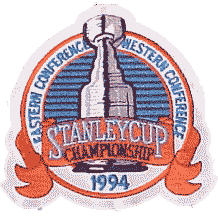
The 1994 Stanley Cup Final was the championship series of the National Hockey League's (NHL) 1993–94 season, and the culmination of the 1994 Stanley Cup playoffs. It was contested between the Eastern Conference champion New York Rangers and Western Conference champion Vancouver Canucks. The Canucks were making the club's second Finals appearance, their first coming during their Cinderella run of 1982, and the Rangers were making their tenth appearance, their first since 1979. The Rangers ended their then record 54-year championship drought with a victory in game seven to claim the long-awaited Stanley Cup. It was the fourth championship in franchise history. The CBC broadcast of the deciding game seven attracted an average Canadian audience of 4.957 million viewers, making it the most watched CBC Sports program in history to that time. This was the last Stanley Cup Final with games played in Canada until 2004, and the last to go the full seven games until 2001.
The Stanley Cup playoffs is the annual National Hockey League (NHL) elimination tournament to determine the league champion. The winner of the Stanley Cup is by default the NHL champion as well. Eight teams from each of the two conferences qualify for the playoffs based on regular season points totals. The final round is commonly known as the Stanley Cup Finals, which matches the two conference champions.

The 1989 Stanley Cup Finals was the championship series of the National Hockey League's (NHL) 1988–89 season, and the culmination of the 1989 Stanley Cup playoffs. It was contested between the Calgary Flames and the Montreal Canadiens, the top two teams during the regular season. This was the second time in the decade after 1986 that the Canadiens and Flames met in the Finals. The 1989 series remains to date the last time that two Canadian teams faced each other for the Stanley Cup.

The 1986 Stanley Cup Finals was the championship series of the National Hockey League's (NHL) 1985–86 season, and the culmination of the 1986 Stanley Cup playoffs. It was contested between the Campbell Conference champion Calgary Flames and the Wales Conference champion Montreal Canadiens. The Canadiens won the best-of-seven series, four games to one, to win their 23rd Stanley Cup, and their 17th in their last 18 Finals appearances dating back to 1956.

The 1984 Stanley Cup Finals was the championship series of the National Hockey League's (NHL) 1983–84 season, and the culmination of the 1984 Stanley Cup playoffs. It was contested between the defending Campbell Conference champion Edmonton Oilers and the defending Wales Conference and Cup champion New York Islanders. The upstart Oilers won the best-of-seven series, four games to one, to win their first Stanley Cup, becoming the third post-1967 expansion team and first former World Hockey Association team to win the Cup, and also the first team based west of Chicago to win the Cup since the WCHL's Victoria Cougars became the last non-NHL team to win it in 1925.
The 1967 Stanley Cup Finals was the championship series of the National Hockey League's (NHL) 1966–67 season, and the culmination of the 1967 Stanley Cup playoffs. A best-of-seven series, it was contested between the Montreal Canadiens and the Toronto Maple Leafs. The Maple Leafs won the series four games to two. In doing so, they won their thirteenth Stanley Cup championship. To date, this is Toronto's last appearance in the Stanley Cup Finals and they have the longest-active championship drought in the NHL. The 1967 Stanley Cup Finals was also the last Stanley Cup Finals in the Original Six Era. This was also the last all-Canadian Finals series until 1986.
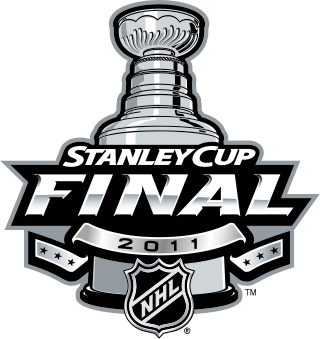
The 2011 Stanley Cup Finals was the championship series of the National Hockey League's (NHL) 2010–11 season, and the culmination of the 2011 Stanley Cup playoffs. The Eastern Conference champion Boston Bruins defeated the Western Conference champion Vancouver Canucks four games to three. The Bruins ended a 39-year Stanley Cup drought with the victory. Bruins goaltender Tim Thomas was awarded the Conn Smythe Trophy as the Most Valuable Player of the playoffs.